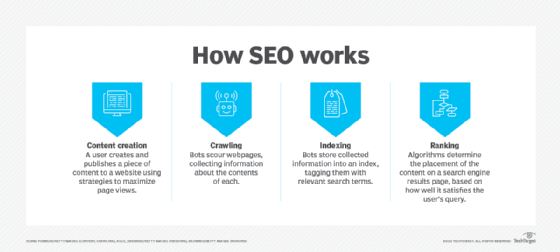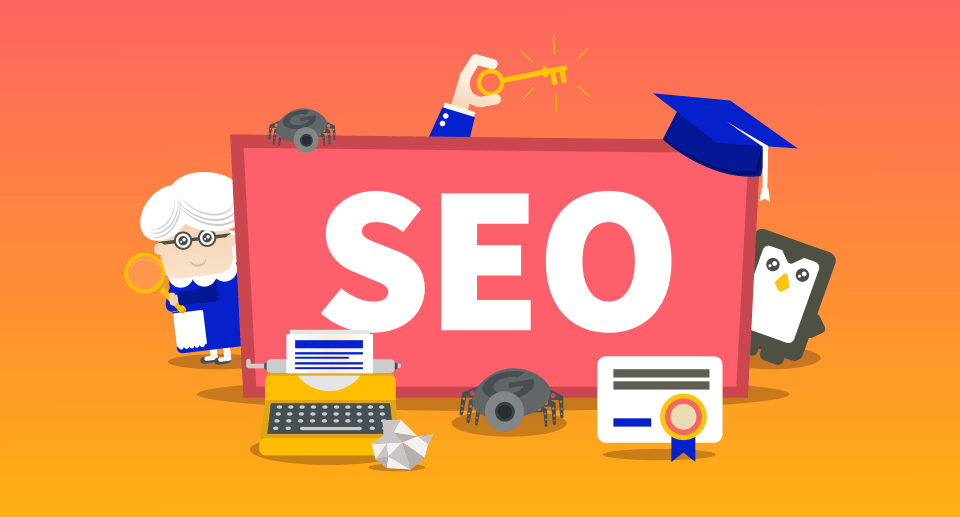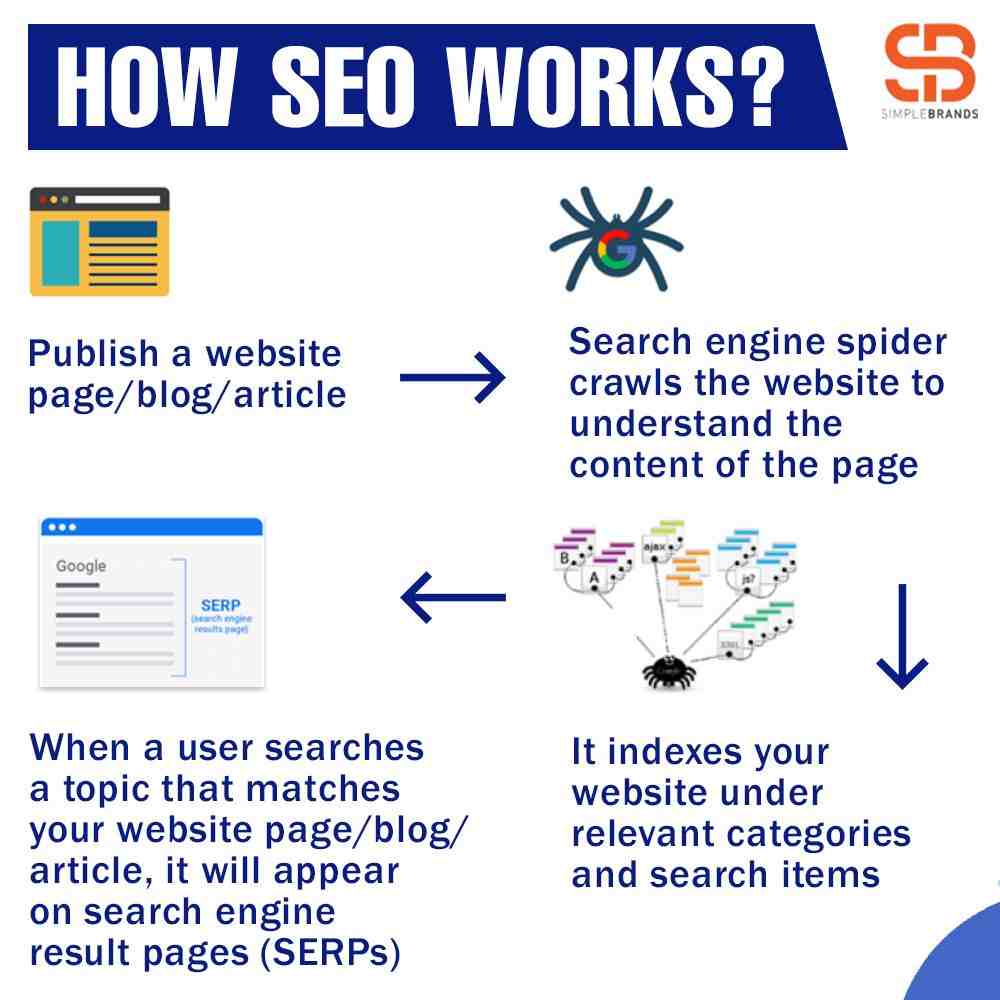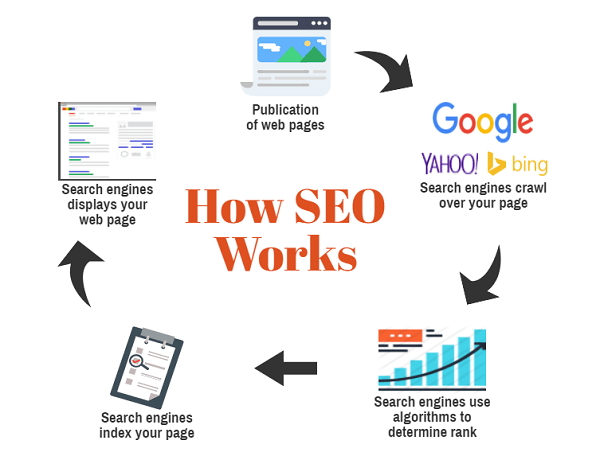You may have heard that SEO is essential when you want to increase traffic to your website.
When you are looking to increase the number of customers coming to your store, incoming calls, and online orders, you need to be visible in Google Search.
Optimizing your web pages helps you rank higher and convert more searchers into customers.
In this article, you will learn about the process used by marketers to optimize your website for search engines such as Google, Bing, Yahoo, and many others.
Let’s start by learning what SEO is all about.
What Is SEO, Anyway?

SEO stands for search engine optimization.
At its core, SEO is the process of getting your website as high as possible in Google when someone types in [burrito blanket] (or whatever you sell, promote or talk about).
The higher your site ranks, the more visible your business is, and the more traffic and sales your business is likely to generate.
You might be a little lost if you are new to SEO.
There are many websites, books and guides (we even wrote one here at Search Engine Journal) to help you get started. But you may find that many resources offer conflicting information.
Part of the reason SEO frustrates so many people is that it is constantly changing.
Why? Because when marketers get their teeth into a “strategy,” they like to run it into the ground.
Basically, we are why we can’t have nice things.
Also, the fact that Google is constantly updating its algorithm.
SEO is a never-ending battle to get more eyes on your website and convince Google that your website is worth sending searchers to.
How Does SEO Work? Your Top SEO Questions, Answered

So, what is important when it comes to SEO?
Before diving into the more technical aspects of SEO, I will answer the most frequently asked questions about SEO.
Is SEO Dead?
Our jobs are over. You should stop now.
I would argue that SEO is constantly dying over and over again. Think of him as Bill Murray in Groundhog Day.
Strategies we have come to know and love are being replaced by newer, more effective ones. SEO best practices die, and new ones are reborn.
So while it’s not dead, SEO is always changing. If you want to succeed in SEO, you have to be prepared to roll with the punches.
What Is The Most Important SEO Factor?
There is no one golden SEO factor that surpasses all the others.
One of the most common answers you get in SEO is, “Well, it depends…”
This might sound frustrating, but it’s the truth.
I could go on, but I think you get the point.
How Long Does SEO Take To Work?
Only Google knows exactly how its algorithm works.
They release updates, and there are a few lists of the most critical ranking factors.
The truth is that SEO takes as long as it takes – that could be weeks or even months, depending on your strategy.
If someone else does something a little better, you may be knocked off the top of the SERPs.
What Is The Difference Between On-Page SEO & Off-Page SEO?
On-page SEO refers to changes you make on the website you own that affect SEO.
For example, adding an XML sitemap to boost your SEO.
Off-page SEO refers to SEO strategies that take place off your website, such as building links to pillar content.
Link Building Is Hard – Can’t I Just Buy Links?
You could. You could also run your hand through a blender. No one is going to stop you. But it is often an ineffective SEO strategy.
Rather than buying links, I would recommend starting with our link building guide.
SEO Factors That Rule Today & Beyond

Now that we’ve covered the basics, you’re ready to get your hands dirty.
Below, we will cover some of the most essential SEO factors.
Remember that SEO trends are constantly changing, and what works now may not work in a few months.
Relevant, High-Quality Content Wins
There are many technical SEO factors – website structure, anchor text, URL structure, etc.
Those details are important, but the backbone of SEO is high-quality content. If you get it right, the rest of SEO will be much easier.
If you want to crack the first page on Google, you need relevant, well-optimized content that earns links.
What is high quality content?
Here are a few things to keep in mind when developing content:
In short, make sure all your content is written for humans first and optimized for Google second.
Metadata Matters
Metadata is the title and lines of text on the search results page.
For example, if you Google [who killed Carole Baskin’s husband], this is the metadata you will see:
Screenshot of search for [who killed Carole Baskin’s husband], Google, July 2022
Metadata tells the user what they can expect to find if they click on the page.
Optimizing your metadata is quite simple:
Think of metadata as advertisements for your content.
Why should users click? What can you tell them?
Use the meta to encourage clicks, which will drive traffic and lead to more business.
Links Matter, But…
Links have been a critical aspect of SEO for as long as Google has existed.
Links work as ‘votes’ which tell Google that other websites think your content is useful and relevant.
The more high-quality relevant links you acquire, the higher your site will likely rank for related key terms.
In short, links are still fundamental to SEO.
But, quality is more important than quantity.
If you’re investing in link building as part of your SEO efforts, target links from popular sites that are relevant to the top in your niche.
User Experience (UX) Impacts Rankings
User experience (UX) plays a significant role in how well your website will rank in Google.
However, user experience depends on many factors such as website infrastructure and design, content, and so on, making it difficult to measure.
If you want to win in SEO, UX should be a top priority.
Here are some best practices to follow:
As Google gets smarter, UX will likely play an even more important role in the future.
So now is the time to learn the basics and implement best practices on your website.
Mobile Matters More Than Ever Before
In 2018, Google moved to mobile-first indexing, which means that the search engine uses mobile versions of your website to rank your websites in their results.
Google’s move makes sense because more than 50% of traffic worldwide is generated from a mobile device.
First, Google suggests investing in responsive design. You must make your content consistent across desktop and mobile devices and ensure that your website loads quickly on both mobile and desktop.
In short, you need to up your mobile game or website to languish at the bottom of Google search results.
Don’t Ignore Voice Search
When it comes to voice, there is a lot of conflicting information out there.
Google said that way back in 2016, voice searches accounted for about 20% of all searches conducted in the Google app.
Today, over a quarter of all Americans own a smart speaker. Yet 72% of marketers have no plans to optimize voice search.
Is voice search important? It does.
Voice search has become more popular and will likely continue to do so. It shouldn’t be your #1 SEO priority, but it makes sense to start optimizing for voice search.
Most of the voice search optimization strategies also make sense for semantic search.
Here are a few steps to help optimize your website for voice search:
Voice search optimization isn’t essential right now, but voice search optimization makes general sense for Google and can give you a boost in the future.
3 Tips For Actually Succeeding In SEO

There are two types of SEO advice: the technical stuff I covered above and the core principles of SEO. The technicalities will change, but these SEO tips stand the test of time.
If It Seems Shady, It Will Probably Burn You
You may have heard of black hat, white hat, and gray hat SEO.
Black hat SEO refers to the practices that are completely against Google’s terms of service.
Like building 10 sites and linking them together to make Google think your crappy bitcoin sites are legit.
This is where the acronym PBN comes into play.
Then there is a gray hat, which may not be technically wrong but walks a fine (grey) line.
White hat is above board, totally legit SEO. Some have argued convincingly that white hat is no longer a thing.
There are many benefits of SEO walking the gray hat line. And many of them are burned.
To succeed in SEO, you need to do things the right way.
If something feels out of place – like buying or selling links – it will probably burn you out and torpedo your chances in the search.
believe me It’s not worth the long-term risk.
Read Real Experts
There are many SEO “experts”.
Some of them claim to get you to the top of page one on Google “guaranteed!”
Others don’t actually do SEO but write a lot about it. Make sure your sources are reputable.
Take everything you read with a grain of salt because nothing is universal.
What works for an e-commerce site in technology is not necessarily going to work for a restaurant supply store.
Pay attention to what comes directly from Google from the likes of John Mueller and Gary Illyes.
Test, Test, And Test Again
SEO is about determining what works for your website in your industry based on your unique landscape.
The only way to find out is to test – and keep testing again and again.
If you’re using shady tactics, all your work might go to waste if Google’s latest algorithm update changes things. But if you apply SEO best practices and test consistently, you can be prepared for when the winds change.
Testing is an eternal part of any successful SEO strategy.
Conclusion

Every SEO professional would love to find the magic formula that rocks their websites to the top of SERPs and keep them there forever.
Unfortunately, SEO doesn’t work that way.
There are rules and best practices, but the core of SEO is finding out what works for your website or client and then changing it when it stops working.
Featured Image: Paulo Bobita/Search Engine Journal
Search Engine Optimization (SEO) is the practice of continuously optimizing a website for higher positions in the organic search results, with a focus on popular search engines such as Google.
What are the 3 steps to successful SEO?
The 3 Steps to Any Successful SEO Campaign
- Step #1 Get to Know Your Buyers and their Search Habits. …
- Step #2 Optimize Your Website and Add New Content. …
- Step #3 Maximize Conversions From Website Visitors.
Can I learn SEO for free?
You can learn how to do Search Engine Optimization, or SEO, for free. All you need are strong resources written or created by SEO experts. We’ve compiled a list of 50 of the best SEO blogs, courses, videos, podcasts, conferences and tools to get you started.
How much does it cost to learn SEO? If you can learn SEO for a few hours every day, then you can master the basics of SEO within 4-8 weeks and get your first SEO job in 3-6 months. If you can learn SEO full time, then you can master the basics even within 1-2 weeks.
Is SEO free or paid?
Many people are attracted to SEO because it is “free website traffic”. And yes, you don’t pay when someone clicks on your site in the organic search results. But make no mistake: SEO is NOT free.
How much does SEO cost?
Average SEO costs are $100-$250 per hour for US SEO agencies. SEO costs often range from $2,500 – $10,000 per month for US agencies. The average SEO plan costs $2819 per month (per Ahrefs) Foreign SEO companies can charge $10-$50 per hour.
Is SEO free on Google?
Google Analytics is one of the best free SEO tools that every digital marketer should be using.
Is SEO a paid search?
SEO has no direct cost. Positioning in organic results is provided for free by search engines, making it a much more cost-effective strategy over the long term. Of course, SEO and PPC have indirect costs. Such as the costs it takes to create and develop online content and maintain it.
Can I learn SEO on my own?
It is possible to learn how to do SEO on your own, you don’t have to be an SEO specialist or expert. The first thing to do is to convince yourself that SEO is not difficult. If others can do it, so can you. All it takes is a willingness to learn and time.
Can I do SEO by myself?
If you have thought, “Can I do SEO myself?†the answer is definitely. You don’t need to hire an outside agency to improve your SEO, and this guide gives you some basic SEO tips to get you started.
How long does it take to learn basic SEO?
It takes 1-3 months to learn the basics of SEO. The basics of search engine optimization can be understood and learned within 3 months, however, the more advanced concepts can take anywhere from 6-18 months. This is provided you use information daily and learn from experts.
What are SEO tools?
SEO tools provide data and alerts about the overall health and success of your website. They help reveal areas of opportunity and identify weaknesses or issues that could prevent you from ranking and gaining visibility in the SERPs. Just as actual tools have a specific role, the same is true in SEO.
What are SEO tools? SEO tools investigate the potential of web pages for high placement on search engine ranking pages. They provide information about backlinks and keywords as well as insight into SEO competition on the Internet.
How much do freelancers charge for SEO?
Hiring an experienced SEO freelancer or agency on an hourly basis usually costs between $50-$150 per hour. Of course, you can find people who charge much less or more than this hourly rate. For example, this SEO hourly rate analysis found that 6% of SEO providers charge over $200 per hour.
Is SEO good for freelancers? If you’re looking to become an SEO freelancer, you’re in good company. This is a popular choice for freelancers and an in-demand field. Anywhere with a website wants its web pages to show up on the top search results. It can make or break their business or income stream.
How much does SEO cost for a small website?
According to a survey of 1,200 business owners and over 350 agencies, freelancers, and consultants, the average cost of SEO for Small Businesses is $501-$1,000 per month globally. The average cost of SEO for small businesses in the United States is $2,501 to $5,000 per month.
How much does SEO cost for a website?
How much can you expect to spend on SEO? If you hire a top level SEO company to implement a local campaign, expect to pay $500.00 per month. A national or international campaign will require a minimum budget of $2,500 to $5,000 per month. Some companies offer a “trial package” at a lower price, with no contract.
What is a good budget for SEO?
If you hire a high-quality SEO company to provide comprehensive SEO services, be prepared to pay $3,000 to $5,000 per month, at least. Many companies spend tens of thousands of dollars a month on SEO.
How much does first page SEO cost?
| Company | Layer | Pricing |
|---|---|---|
| #1 | Full service | $10,000 to $15,000 per month |
| #2 | Full service | $7,500 to $12,500 per month |
| #3 | Content Marketing | $5,000 up front and $2,500/mo |
| #4 | Content Marketing | $3,500 to $6,000 per month |
How much should I charge for local SEO services?
How Much Does Local SEO Cost on Average? For a one-time project focused on analysis, research, cleaning and optimization the average price of a Local SEO project would range from $300 – $1500 with an average price around $750.
How much should I charge for SEO optimization?
| Math | Cost |
|---|---|
| Cheap SEO | $500 to $3,000 per month |
| Mid-range SEO | $3,000 to $15,000 per month |
| High end SEO | $15,000-$30,000 per month |
| Enterprise SEO | $30,000-1 million per month |
How much does local SEO cost per month?
Typical local SEO campaigns cost between $300 and $2,000 per month depending on your business needs, your competition, and your geographic location.
How much should a small business pay for SEO?
How much does SEO cost small businesses? The average cost of SEO for small businesses is $750 to $2000 per month or $5000 to $30,000 for one-time projects. Smaller companies that invest in SEO consulting services can expect to pay $80 to $200 per hour.

